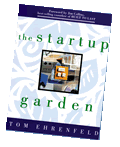
Applying Startup Garden Rules: Learning eBay Over the past three months I’ve started buying, and more recently selling, stuff on eBay. And the experience has confirmed to me that the web truly is becoming embedded ever more deeply into people’s daily habits, in the process enabling personal entrepreneurship to a greater degree possible. Over the years there have been many excellent articles about the impact of eBay on small business; one of my favorites was written by Dave Freedman five years ago (!) for Inc. Magazine. In Can You Save the eBay Economy, the immensely talented Freedman made this argument: “What the Web has done is level the playing field between small businesses and the micro-businesses that until now barely showed up on anybody’s radar screen. These microbusinesses are individuals without a substantial—or in many cases, any—business history or infrastructure behind them. Operating with virtually no overhead, typically with little inventory, and sometimes in legal gray zones, these one-person shows are often able to offer fire sale prices and still maintain a modest margin. And the billions of dollars in revenues that they aggregate are piling up come, to a certain extent, out of the coffers of more traditional businesses.” But I’ve been really struck by the way in which getting going on eBay really takes hold of you, and taps into many of the personal elements of entrepreneurship. Resource break, readers: I did find one book superior to all others in helping convert my naive idiocy into mere technical mediocrity, a place where I have become competent enough not to obsess over process issues. My pick is The eBay Survival Guide by Michael Banks. Like many titles in the No Starch Press line of computer books, this guide is smart, focused, and does a terrific job of balancing a wealth of useful information with a clear and inviting tone. I basically learned just about everything I needed to know, from the basic information to the more advanced matter as well. In other words, in addition to learning how to sell stuff, the book does a surprisingly good job of sharing pointers on how to make good decisions about just what to sell in the first place, and when, for example, it simply isn’t worth your time. Over the past weeks I’ve been selling lots of children’s books my daughters have outgrown, and see why people get absolutely hooked on eBay. The auction format, whether you’re a buyer or a seller, becomes utterly intoxicating. As the contest ticks down, you feel this compulsion to track its progress—and you really want to place the winning bid—or spark a bidding war. But for me, the experience appeals beyond the great reward of getting stuff out of our house and converting it to cash. This process reinforced my belief that eBay and other tools are fomenting the rise of, I don’t know, individu-entrepreneurship: ventures that balance a greater depth of personal color with a more standardized (i.e. tech-enabled) tool kit of professional functions. So businesses are becoming more personal by, in a sense, sharing a more common technical infrastructure. And everyone must achieve a degree of overall entrepreneurial competence to get in the game. That is to say, anyone who wants to sell stuff on eBay must develop a handful of the key tools essential for any entrepreneurial success: an understanding of a market, the ability to price a product, the chops to market it with a degree of proficiency, the technical know-how to make it work, and finally, enough of an overall understanding of the numbers to make the enterprise worthwhile. There are days where I get a bit cranky about what the web has wrought, particularly when I find people too wowed over what it could do as opposed to what it really does do. But ultimately I remain a believer in its transformative power. For example, there was a great story in yesterday’s Wall Street Journal about the growth in internal, mini wikis within companies who are “co-opting consumer Web technologies for everyday office use.” I thought it was a hugely important article—and reveals that while there’s been so much blather about the Wikipedia (in my opinion) the real genius of the tool has been realized in more focused and controlled settings. One final thought triggered by all this: the continued waves of technology are doing a job of creating and destroying temporary opportunities for folks comfortable with technology. The first waves are almost always dominated by the few who are more comfortable with the toys; yet as people figure out how to make the interface Mac-like rather than PC-like, many more of us jump in. Posted by tom at September 13, 2006 12:06 PMComments
Post a comment
|
Recent Writing Flow as the Grand Unifying Theory of Productivity Lowering the Personal Entrepreneurial Threshold Good Writing Begets Good Writing
THE BOOK
Read or print the Intro and
Read some book reviews at Inc, 1-800-CEO-READ, and the Miami Herald. Read the publisher's press release. Visit the companies that Tom discusses in the book Hear a recent lecture by Tom on the Startup Garden STARTUP RESOURCES Read about other books and web sites about starting your own business. TOM'S WRITING Just Managing – articles that Tom wrote for The Industry Standard and some Business Articles written for Inc., Fortune Small Business, Harvard Management Update, and other places. BUY THE BOOK To buy directly from me, simply go to Paypal and send 15 bucks to Tom@startupgarden.com. I'll take care of the rest. If you have any questions, email me at that address. |
| © 2001-2003 Tom Ehrenfeld | Site design by Tim Swan | |
